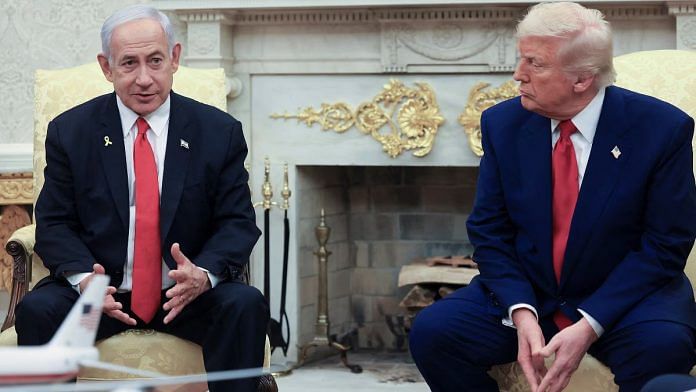This shift is especially jarring given Netanyahu’s claim to have personally convinced Trump to scrap the —a landmark Obama-era accord. Now, Trump is quietly seeking a similar arrangement, this time to avoid direct military engagement.
On 6 May, US backing for military operations against Yemen’s Iran-backed Houthis, leaving Israel exposed. After a successful missile strike on Ben Gurion Airport, major international airlines—including Air India—suspended flights. Trump made the decision unilaterally. Israel wasn’t even consulted.
Even on the emotionally and politically fraught issue of hostages in Gaza, Trump has bypassed Netanyahu’s government. His envoy, Steve Witkoff, secured the release of American-Israeli Edan Alexander through quiet diplomacy with Hamas. Neither Alexander nor his family publicly credited Netanyahu. Their thanks went entirely to Trump and Witkoff. “Israel is pointlessly extending the war,” Witkoff reportedly in Jerusalem. Trump, who otherwise has let Witkoff criticise Netanyahu’s approach, later , “I don’t know if [Netanyahu] can get the hostages out.”
Israel’s isolation has been one of the major challenges for its foreign policy since its inception. Arab States and their rejection of the UN partition plan in 1947 or later multiple wars created a deep sense of distrust and cynicism among Israelis. However, times have changed, and now Israel is missing out.
By refusing to end the war in Gaza or allow the Palestinian Authority a role in reconstruction, Netanyahu has squandered a rare diplomatic opportunity: normalisation with Saudi Arabia. Trump hoped to expand the 2020 Abraham Accords—which brought Israel into formal ties with the UAE, Bahrain, and Morocco—by bringing the Saudis into the fold. But Israeli intransigence has stalled that prospect. Ironically, Netanyahu is now losing a historic opportunity for peace.
This moment recalls a famous line by Abba Eban, Israel’s former foreign minister and one of its most articulate diplomats. In the wake of Arab rejection of the 1947 UN partition plan, Eban that “the Arabs never miss an opportunity to miss an opportunity.” For decades, this quote was held up as a shorthand for Arab intransigence. But over time, many Arab States chose the path of peace: Egypt in 1978, Jordan in 1994, and several Gulf and North African states in 2020. Today, it is Israel, under Netanyahu’s leadership, that chose indefinite war in Gaza over diplomatic peace with the Arab states.
Last week in Riyadh, signalled that he had moved on. “It’s my fervent hope, wish, and even my dream that Saudis will soon join the Abraham Accords,” he said. “They will join in their own time,” he added pointedly. The message was clear: Trump would not wait for Netanyahu.
For India, Netanyahu’s present miscalculations carry real strategic consequences. Flagship initiatives like the India–Middle East–Europe Economic Corridor (IMEC) and the I2U2 grouping (India, Israel, the UAE, and the US) rest on a fragile foundation of regional integration, economic interdependence, and diplomatic equilibrium. These ventures presumed that Israel would act as a stabilizing, forward-looking partner in multilateral settings. Netanyahu’s war-first approach—marked by the protracted bombing of Gaza, the alienation of Arab partners and European de-escalation efforts—risks unraveling these assumptions.
India has offered Israel unwavering rhetorical support in its war against Hamas, but it has so far refrained from reversing its long-standing endorsement of the two-state solution. Foreign Minister articulated this delicate balancing act: “On terrorism, we are with Israel; on a Palestinian state, we are with the Palestinians”, while he addressed the Munich Summit in February 2024. Yet this fence-sitting may soon be tested as Israel expands its military operations in Gaza.
Prime Minister Narendra Modi famously told Russian President Vladimir Putin, “This is not an era of war”—a moral admonition that Putin disregarded in his invasion of Ukraine. It’s a principle India would do well to apply consistently, even with friendly regimes. As a rising power invested in global multipolarity and rules-based order, India cannot afford selective silence when strategic partners undermine peace. Doing so weakens not only India’s normative voice, but also the geopolitical architecture it is trying to help shape.
(Edited by Ratan Priya)








